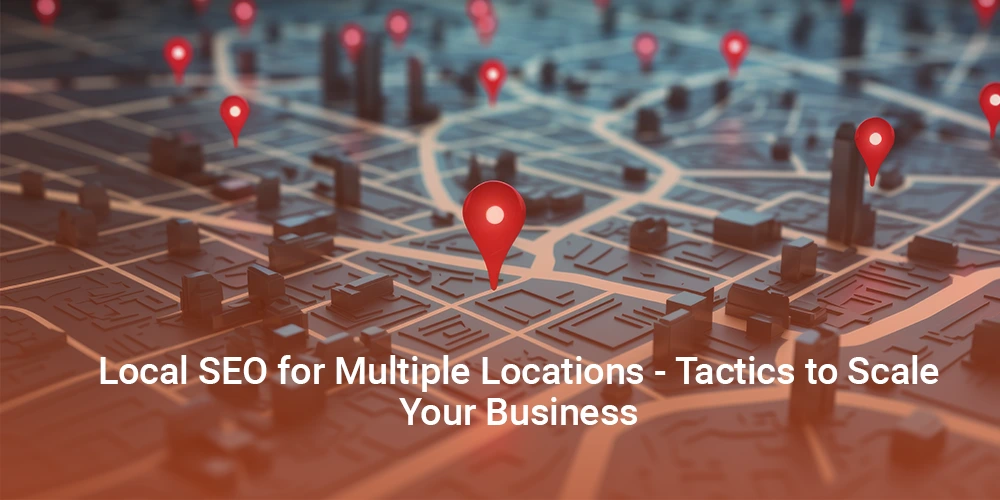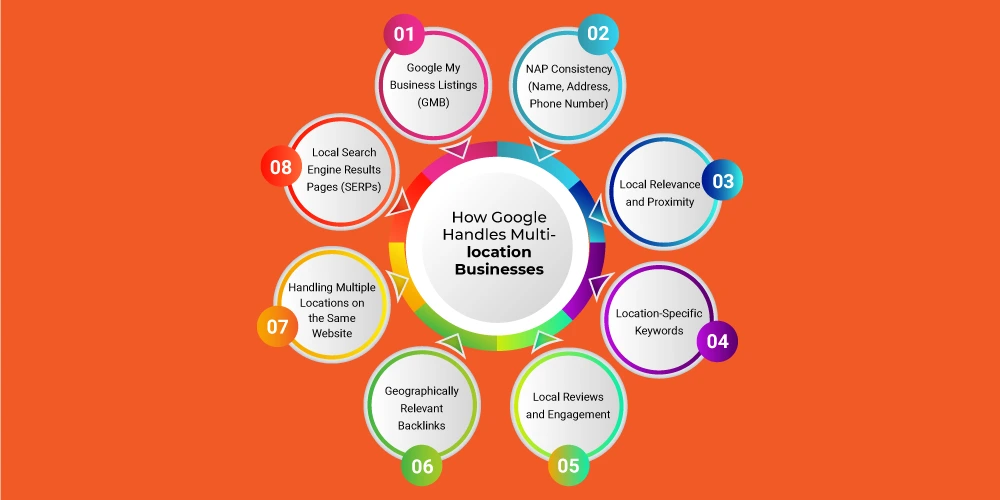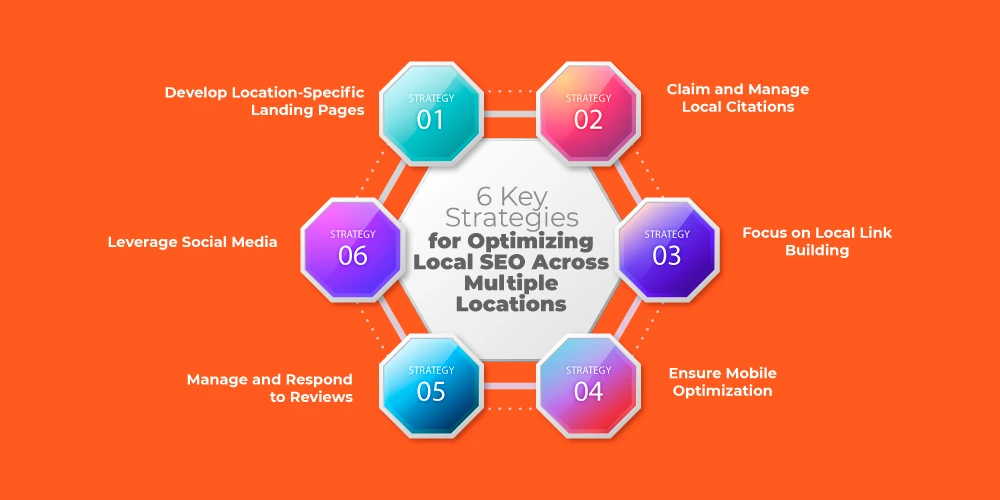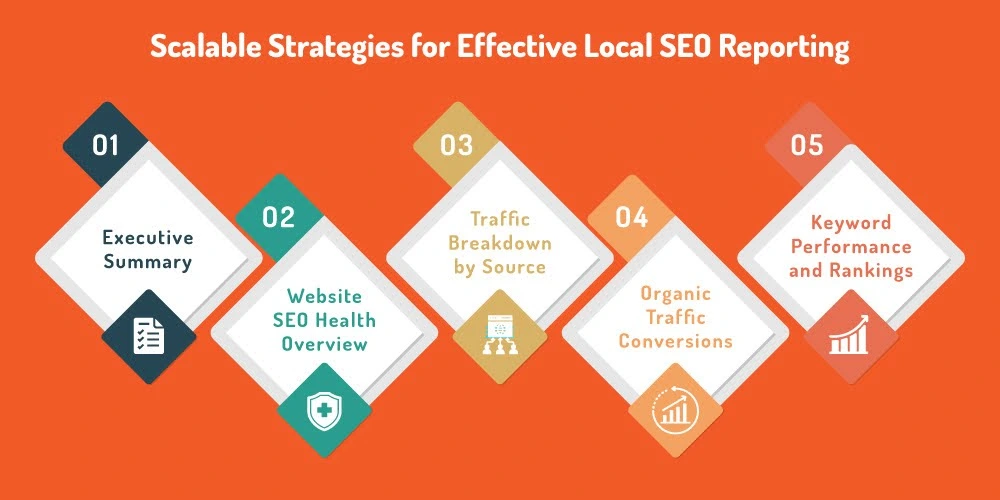Local SEO for Multiple Locations
Updated : April 22, 2025

Each location has its unique set of customers, search behaviors, and competition. Effective local SEO can help businesses show up in relevant search results, driving foot traffic and conversions across all locations. However, optimizing for multiple locations requires a different approach than traditional SEO.
In this blog, we’ll explore key strategies for enhancing local SEO across multiple locations, ensuring that each branch or store gets the visibility it deserves and reaches its target audience.
What is Multi-location SEO and Why It Matters
Multi-location SEO focuses on optimizing your online presence to rank in local searches across different business locations. Each location needs a designed approach to ensure it ranks well in relevant search results. Optimizing for multiple locations increases the chances of attracting nearby customers and driving more foot traffic.
How Google Handles Multi-location Businesses
Google uses a variety of signals and algorithms to determine which businesses to display in local search results, especially for multi-location businesses. Google ranks multi-location businesses based on local search queries and the user's location.

Learn how Google processes and ranks businesses with multiple locations.
1. Google My Business Listings (GMB)
Google My Business (GMB) is a central element in how Google handles local SEO for multi-location businesses. Each location needs its own GMB listing. Google uses these listings to display information about your business, such as name, address, phone number, business hours, and location on Google Maps.
For multi-location businesses, Google expects each location to have a separate GMB profile. These profiles should be optimized with accurate information specific to each location.
For example, if your business operates in New York and Chicago, each city needs its own GMB listing that highlights the unique address, contact details, and relevant local information. Failure to do so could lead to confusion and miscommunication, affecting your local search rankings.
2. NAP Consistency (Name, Address, Phone Number)
One of the most important factors Google uses to rank businesses is consistency in your NAP data across the web. For multi-location businesses, ensuring that your name, address, and phone number are identical on your website, GMB listings, local directories, and other third-party sites is critical.
Google checks for consistency between your listings to confirm that the information is legitimate. Any inconsistency, such as a different phone number listed on Yelp compared to your GMB profile, can negatively affect your local rankings. It's essential to regularly audit your NAP data and ensure that it’s consistent across all platforms for each location.
3. Local Relevance and Proximity
When a user searches for a business near them, Google takes several factors into account, with one of the most important being proximity. If you have multiple locations, Google will prioritize showing the nearest store based on the user’s location.
For instance, if someone searches for "best pizza near me" in New York, Google will show the locations closest to that user. To help Google understand which location is most relevant, you need to ensure that each location is properly optimized with localized content, keywords, and proper categorization in GMB.
4. Location-Specific Keywords
Google uses location-based signals, such as city names or neighborhood identifiers, to rank multi-location businesses. For example, “plumbing services in Manhattan” will be different from “plumbing services in Brooklyn” in terms of search intent and ranking factors.
Google understands that businesses with multiple locations often serve different geographic areas, so using location-specific keywords in your website content, landing pages, and GMB descriptions helps Google display the right results. For example, having unique landing pages for each location with local keywords (like “Best Coffee in Downtown Chicago”) will help Google recognize your business as relevant to the specific area.
5. Local Reviews and Engagement
Google places significant importance on customer reviews. Positive reviews from customers in specific locations can boost your ranking for that location. Google uses reviews as a trust signal, and the more reviews you have from customers in each region, the more Google will associate that location with relevance and trustworthiness.
For businesses with multiple locations, it's important to manage and encourage reviews for each location individually. For example, a review for your New York location should be associated with that location’s GMB listing. Additionally, responding to these reviews helps increase engagement and signals to Google that your business is active and responsive.
6. Geographically Relevant Backlinks
Backlinks from local websites also play an important role in Google’s ranking process. Google considers links from geographically relevant sources (such as local news sites, regional blogs, or local business directories) to be more authoritative for ranking purposes.
For example, a backlink from a local Chicago-based news site would carry more weight for your Chicago location than for your New York location. It’s essential to build backlinks for each of your business locations from local sources to improve rankings and credibility for each region.
7. Handling Multiple Locations on the Same Website
When you have multiple locations, it’s important to structure your website in a way that Google can easily differentiate between each location. Each location should ideally have its own unique page with relevant content, location-specific keywords, and localized offers or promotions. Google prefers this because it can easily associate each page with its corresponding location and the appropriate local search queries.
Additionally, using structured data (Schema markup) for each location page can further enhance how Google understands the geographical relevance of each page. Structured data helps search engines parse and display specific location-related information, such as hours, address, and contact details, directly in the search results or on Google Maps.
8. Local Search Engine Results Pages (SERPs)
When it comes to search results, multi-location businesses can appear in both local and organic search results, depending on the search query and the user’s location. Google’s local pack (the map and the three business listings shown at the top of local searches) is where multi-location businesses have the best chance of appearing. However, being listed here is highly competitive. Google ranks local businesses based on several factors, including proximity, relevance, and prominence. The more optimized your GMB profiles are, the better your chances of appearing in the local pack for each location.
Read More: SEO Checklist for Optimizing Your Website
4 Local SEO Tactics to Rank Multiple Locations on Google
To rank multiple locations effectively, implement these key local SEO tactics:
- Optimize Google My Business Listings: Create a unique GMB listing for each location with accurate details such as address, phone number, and business hours.
- Target Location-Specific Keywords: Include local keywords in your content, such as “best coffee in Downtown Chicago” or “affordable plumbing in Brooklyn.”
- Create Location-Based Content: Develop unique landing pages for each location, showcasing relevant content like local events, news, or customer testimonials.
- Collect Local Reviews: Encourage customers to leave reviews specific to each location. Positive reviews enhance trust and improve rankings.
6 Key Strategies for Optimizing Local SEO Across Multiple Locations
Follow these six strategies to optimize local SEO for your multiple locations:

1. Develop Location-Specific Landing Pages
Each location should have its own landing page that is specifically tailored to its geographic area. These pages should target location-based keywords (such as "plumber in [city name]") and provide unique content related to the specific region. For example, instead of a generic "Our Services" page, create individual pages like "Plumbing Services in New York City" or "Best HVAC Solutions in San Francisco."
Why this matters
Pages optimized for local keywords are more likely to rank higher in search results, driving more organic traffic to each location. According to HubSpot, 72% of consumers who search for local information visit a store within five miles of their location. A dedicated landing page increases the chances of showing up in these relevant local searches.
2. Claim and Manage Local Citations
Citations are mentions of your business name, address, and phone number (NAP) across the web. Listing your business in local online directories (like Yelp, Yellow Pages, or Google My Business) can significantly improve your local SEO. Ensure your NAP is consistent across all platforms to avoid confusing search engines or customers.
Why this matters
Inconsistent NAP details across directories can hurt your rankings. A study by BrightLocal found that 86% of consumers rely on online reviews and business listings to make decisions, and 50% of local searches on mobile lead to store visits within 24 hours. Managing local citations properly boosts credibility and trust, improving your visibility in search results.
3. Focus on Local Link Building
Building backlinks from local websites—such as news outlets, blogs, or local business directories—can greatly increase your authority in local search results. These local backlinks signal to Google that your business is closely connected to the community, improving your chances of ranking higher.
Why this matters
Google values backlinks as a ranking factor, and local backlinks are even more beneficial for businesses with multiple locations. A study by Moz showed that link signals are the third-most important ranking factor for local SEO. Securing local backlinks can improve your domain authority, making your business appear more relevant and trustworthy in local search.
4. Ensure Mobile Optimization
A large percentage of local searches are conducted on mobile devices. It’s essential that your website is mobile-friendly to ensure a smooth user experience and improved rankings. Google’s mobile-first indexing means the mobile version of your website is prioritized for rankings over the desktop version.
Why this matters
According to Google, 76% of people who search for something nearby on their smartphones visit a business within a day. Additionally, 61% of users are unlikely to return to a site that isn’t mobile-friendly. A mobile-optimized site ensures better user engagement and higher rankings in mobile search results, ultimately improving your local visibility.
5. Manage and Respond to Reviews
Customer reviews are a crucial part of local SEO. Responding to both positive and negative reviews shows Google and potential customers that your business is active and engaged with its audience. Aim to collect reviews on Google My Business and other platforms relevant to your industry.
Why this matters
97% of consumers read online reviews for local businesses, and 85% of consumers trust online reviews as much as personal recommendations (BrightLocal). Additionally, responding to reviews—especially negative ones—can positively influence your reputation and rankings. Google also considers review signals when determining rankings, so actively managing reviews can improve both customer trust and local SEO.
6. Leverage Social Media
Social media platforms provide an excellent opportunity to share location-specific content, connect with local customers, and drive traffic to your site. By posting regular updates, promotions, and location-centric content, you can increase your local visibility and create stronger engagement with the community.
Why this matters
While social media doesn’t directly impact local search rankings, it plays a role in increasing brand awareness and customer engagement. According to a study by HubSpot, 73% of marketers believe that social media marketing has been somewhat or very effective for their business. Sharing location-specific content on social media platforms can drive targeted local traffic to your website and positively impact your local SEO efforts.
Common Challenges in Multi-location SEO and How to Overcome Them
Managing multi-location SEO comes with challenges:
- Maintaining NAP Consistency: Inconsistent NAP details across platforms can hurt rankings. Ensure your address and phone number are correct and consistent everywhere.
- Avoiding Duplicate Content: Replicating content across location pages can lead to SEO penalties. Customize each page with unique, location-specific content.
- Managing Multiple GMB Listings: Keep each GMB listing updated and accurate. Regularly check for discrepancies to avoid confusion among customers and search engines.
- Facing Local Competition: In highly competitive areas, ranking can be difficult. Focus on what differentiates your business locally and continuously optimize your SEO strategy.
Efficiently Track All Your Clients’ Local SEO KPIs in One Dashboard
Tracking performance for each location can be challenging. Use an all-in-one SEO dashboard to monitor key local SEO KPIs such as:
- Local keyword rankings
- Website traffic from each location
- Google My Business insights (clicks, calls, directions)
- Reviews and ratings
This helps you stay on top of each location’s performance and make data-driven decisions.
Scalable Strategies for Effective Local SEO Reporting

As your business expands, reporting must scale with it. Most clients aren’t interested in the technical jargon but want clear, actionable insights that demonstrate the impact of your efforts.
To make sure your clients get the most out of your local SEO report and truly see the value in your work, include:
- Executive Summary Begin with a brief summary that highlights the key goals, KPIs, tasks completed, and results achieved. This section should be written in simple, clear language so clients can easily understand the progress.
- Website SEO Health Overview In this section, focus on common challenges like slow page load times, broken links, or missing meta tags, and outline how you’re addressing these problems. This gives clients reassurance that their site is being optimized for sustainable SEO growth.
- Traffic Breakdown by Source Clients want to know where their traffic is coming from, so providing a clear breakdown of traffic by channel is crucial. Cover key sources like organic search, direct traffic, referrals, and paid search performance for each location. This helps clients understand which channels are driving the most traffic and whether local SEO is generating observable results in each region.
- Organic Traffic Conversions It’s not just about traffic—clients want to see how it translates into real results. This section should demonstrate how organic traffic is driving conversions, such as leads, sales, or other specific goals. Use Google Analytics goals to track and report on these conversions, clearly showing how your SEO efforts are directly contributing to revenue and business growth.
- Keyword Performance and Rankings Tracking keyword rankings is a key part of evaluating SEO success. In this section, highlight how well the business is ranking for target keywords in each location. Show how rankings have improved and explain how the multi-location strategy is performing. This provides insights into the effectiveness of your approach.
Take Your Local SEO to New Heights with Kaizen Global’s Expertise
At Kaizen Global, we understand that every business is unique, and we specialize in developing tailored Local SEO strategies that align with your brand’s goals. With the right approach, we help you scale effectively and efficiently across all your locations.
Ready to boost your local search rankings? Contact Kaizen Global for Professional SEO Services and let’s take your local SEO to the next level.
Take control of your smart contract security - Request a professional Smart Contract Audit today and ensure the solidity of your blockchain projects
Insights

The Complete Guide to SEO for Electricians
Electricians today face fierce competition in a digital world where visibility is key. The competition is now beyond traditional word-of-mouth referrals ...

Future of SEO in 2025
Google is the dominant search engine on the web in the United states. In most world markets a heavy focus on SEO is a smart strategy ...

SEO for Home Builders: A Simple (But Complete) Guide
Search Engine Optimization (SEO) enables websites to become visible in search engines during search sessions for featured products or services ...